Global Forum For Indurstrial Devlopment is SPONSORED BY ICO INDIA
- MP Society Registration (Act. 1973 No. 44) 03/27/01/21857/19 (MSME Forum Established Since-2009)

As more people aggregate in megacities, urban agriculture is starting to be viewed as a sustainable way to produce and efficiently supply locally-grown fresh produce to cities. In India, there are 2 starkly contrasting varieties of urban farming
Urban farmers by default: Small-holder farmers that subsist (and sometimes operate successful businesses) on patches of agriculture-zoned land that have gradually been enveloped by urban development.
Plentiful sunlight, and relatively friendly year-round weather mean that a growing number Indian city-dwellers have successfully taken to rooftop farming. Some examples are this rooftop organic farm in Pune, or this one in Kerala. These individuals with their rooftop vegetable and fruit gardens and even mini-paddy fields supply their own kitchens and those of friends and family year round.
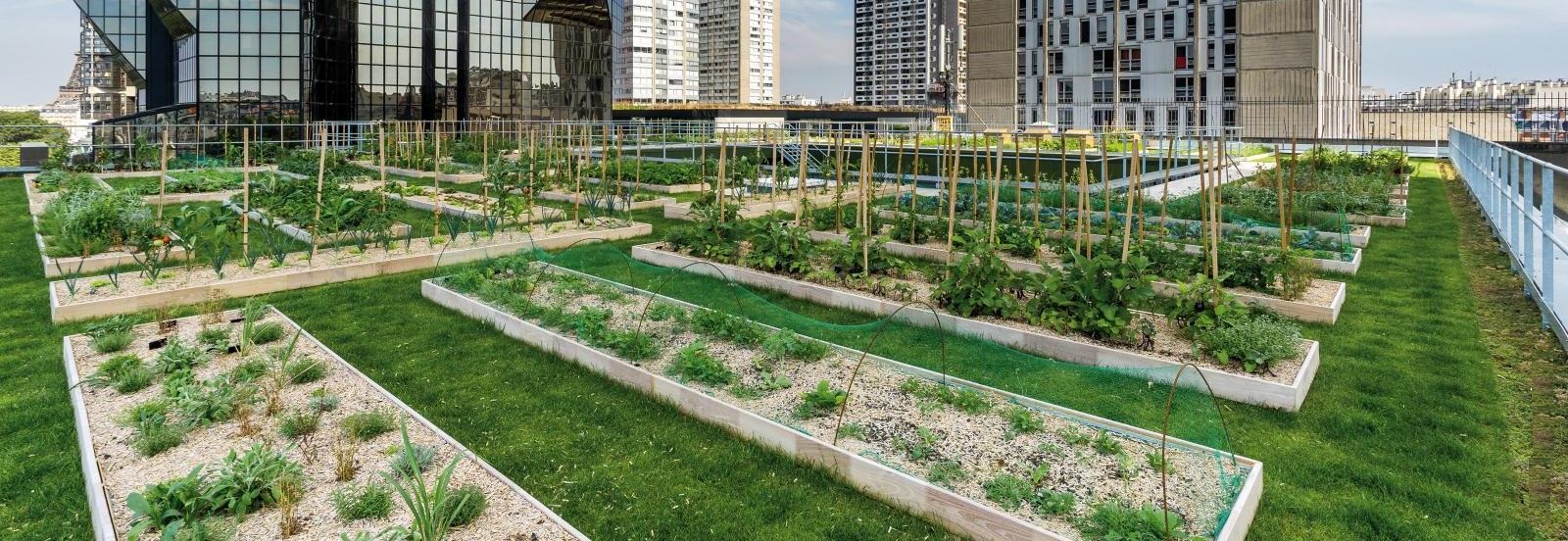
There is also a host of startups facilitating small scale urban farming, for individual homes and for institutions like schools. Some examples are Jaipur-based company The Living Greens , offers to help set up and maintain organic urban rooftop farms, iKheti, which offers similar services in Mumbai and Pune,Delhi-based Khetify and Edible Routes, Hyderabad-based Homecrop, and Bengaluru-based Greentechlife and Squarefoot Farmers. While there are plenty of hobbyists, and family-and-friends farmers, there is a long way to go before rooftop farming is serious business in India.
Civic bodies like the corporation of Thiruvananthapuram have initiated larger scale, sustainable initiatives to help citizens grow healthy fresh produce locally. Residents are offered services and subsided kit to grow up to 30 vegetable varieties.
Hydroponics and vertical farming techniques are also gaining some ground, but have yet to be proven to work with traditional indian vegetables. Ajay Naik operates a hydroponics farm in Goa, growing vegetables like lettuce and salad greens. Startups such as FutureFarms that aim to help urbanites grow fresh healthy produce using hydroponic techniques.
In stark contrast to these ‘farmers by choice’ are the traditional farmers who use urban land because it is all they have available, and depend on urban farming for subsistence.
The best known example is probably the fruit, vegetable and flower growers who operate on small patches of land along the banks of the Yamuna river in Delhi. The vegetable and flower growers who own or rent small patches of land along the banks of the Yamuna, in suburban Delhi. They make just enough to subsist, seasonally rotating crops such as tomato, peas, onion, gourd and bitter gourd, spinach, cauliflower and radish, for sale in the local vegetable markets. As many as 7000 small urban farmers are estimated to exist around Delhi alone, providing fresh vegetables to the urban population. Constant threat of displacement by construction, lack of clarity about land ownership and zoning, as well as effluents that pollute the water they use for irrigation.

A second example is a 1000+ buffalo dairy farm in the midst of Jogeshwari (pictured), just underneath the flyover. While its a thriving, profitable business, supplying fat-rich buffalo milk to the community. However, concerns around and the health and safety of the animals and that of the humans living in proximity to them, concerns around zoonoses, and disposal of animal waste. They also have to contend with the city corporators, and builders eyeing prime property for yet another skyscraper. Is there a way to modernize, sanitize, mechanise and preserve these havens of productivity?
It seems like Indian city-dwellers are trying to bring farms to their rooftops on one hand, while crowding out existing urban producers on the other.

Hamsa V and Nithin Sagi broke away from their lucrative IT jobs with Infosys to pursue their dreams. Sagi had earlier taken up food photography and later partnered with Hamsa to open Growing Greens. The company is a business-to-business venture that sells microgreens, edible flowers, salad leaves, sprouts and herbs to five-star hotels, high-end restaurants and cafes in Bengaluru. “When we had started back in 2012, hotels would import microgreens from other countries due to the lack of local produce,” shares Hamsa.
Microgreens are young, small-sized, approximately one to three inched, tall vegetable greens with an aromatic flavour that chefs mostly use to decorate and dress food. These young plants are said to have concentrated nutrient levels that can go 40 times higher than the normal size produce.
Sagi and Hamsa did thorough market research before starting Growing Greens. They interacted with various chefs to understand their requirements and, in the process, were introduced to microgreens. Hamsa recalls, “Chef Manu Chandra helped us immensely in our journey. He was also our first client.” Growing Greens has grown gradually and consistently over the years. Sagi shares, “We started from a small terrace and today we are farming in four acres of land. We plan to take it up to 10 acres in the next two to three years.”
The impediment to farming in a city is the lack of availability of space. But technology, with all its wonders, has made farming possible in small spaces through urban vertical farming and hydroponics. Instead of soil, a nutrient-rich water solution is used to grow the plant in hydroponics or soil-less farming. Urban vertical farming is a method in which such hydroponic or other technology used planted plants are grown vertically, one over the other in a small space. As there is no soil, the weight on the wall or a roof is significantly reduced and there is no structural damage caused to the building.
Urban farming also ensures more control over the way food is produced. Hamsa shares, “We do not use any pesticide or chemicals on our food. We also provide live microgreens to hotels and restaurants, i.e., microgreens that are not cut but with their roots intact.”
Mumbai-based banker turned farmer Linesh Pillai was introduced to urban farming in 2010 when he was in Poland. Disturbed by the high levels of contamination in food here upon his return, Pillai decided to grow his own vegetables. He started Terra Farms in 2012 and later renamed it as Urban Fate Farms or UGF Farming. He divides the operations of his company into four verticles broadly—Education, Dead Space Activation, Retailing and Zero Carbon Food Project. Under education, UGF visits schools and organizations to teach people how they can easily grow their own vegetables in the city. The Dead Space Activation is done for big hotel chains and high-end restaurants where UGF sets up a hydroponic plant and handholds them through the entire process until they learn to do it themselves. Some of their clients are Hyatt Moscow, Hyatt Delhi, Olive Bar and Kitchen Mumbai. Under retailing, UGF sells their live microgreens and leafy greens at Hypercity, BigBasket and Big Bazaar.
Zero Carbon Food Project tries to minimize carbon emissions created by our food habits. Pillai shares, “We have created a greenhouse at Don Bosco School, Manori. Growing the food where it is consumed reduces the carbon emission otherwise caused in logistics and cold storage.” UGF currently operates in Mumbai, Bengaluru and USA. The company plans to expand and open its office in Dubai by June 2020.

Homecrop, founded by four graduates from Vellore Institute of Technology Manvitha Reddy, Sharmila Reddy, Sai Krishna and Krishna Reddy, brings urban farming to your backyards, terraces and balconies. The company sets up edible farms for urban households who want to grow their own vegetables. Manvitha feels that “people can become more empathetic and understand a farmer’s challenges by growing one’s own vegetables.”
Homecrop’s journey has not been an easy ride. Manvitha divulges, “It was very hard to convince people to pay someone to set up a kitchen garden for them.” The organisation now has a dedicated set of clients in Hyderabad. It also sells its DIY farming kits online pan-India through its website as well as through Amazon. Manvitha is grateful that she and her co-founders who have no background in farming are incubated at a-IDEA (Association for Innovation Development of Entrepreneurship in Agriculture), the technology business incubator hosted by ICAR-NAARM (Indian Council of Agricultural Research; National Academy of Agricultural Research Management) in Hyderabad.
“The incubation gave us the levy to experiment and learn. There was a lot of trial and error but we are lucky to have received solid mentoring,” claims Manvitha. However, in terms of funding an urban farming enterprise, things are still bleak in India. Homecrop not only sets up customized edible farms for its clients but also provides impeccable maintenance services. For the first two months, it regularly pays visits to the client’s garden who can later opt for ad hoc visits.
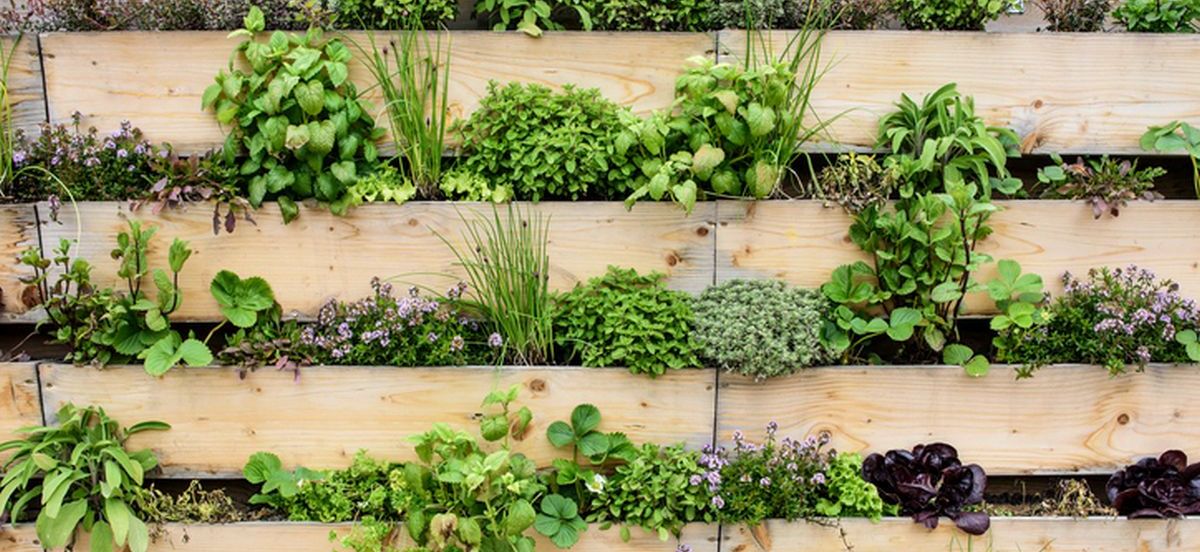
Somveer Singh Anand, much like Pillai, is also a banker turned farmer. Upon his return to India from New York where he was working as a banker, he again like Pillai, found it impossible to source organic and uncontaminated food. Using his knowledge to develop indoor hydroponic technology suitable for Indian climatic conditions, Anand started Pindfresh in 2016. Anand confesses, “Selling mutual funds and insurance policies as a banker in the US was dreadful. I did not enjoy what I was doing.”
Pindfresh sets up indoor and outdoor hydroponic plants for people who want to farm using the technology. Anand’s knowledge of hydroponic did come in handy but there were other obstacles to overcome before coming out with the perfect technology. “The climatic conditions in the US and in India are completely different. What worked there did not work here. So, I had to control lighting, humidity and temperature. It is all science and once I got it right, the first feat was achieved,” professes Anand.
Pindfresh manufactures the pipes, lights and all the other equipments required to set up a hydroponic plant. The company earlier would outsource these components for the plant but were dissatisfied with the quality. Anand shares, “The quality of individual components would affect the overall quality of the plant. So we started manufacturing everything in-house to provide top quality to our customers. It gave us better quality control.”
Pindfresh is headquartered in Chandigarh but that doesn’t stop the company from being available to its customers across India. “We get on a video call and guide our clients accordingly. We are also just a call away for any query. We believe if the client has invested their money in something, they should get the maximum value out of it,” he declares.
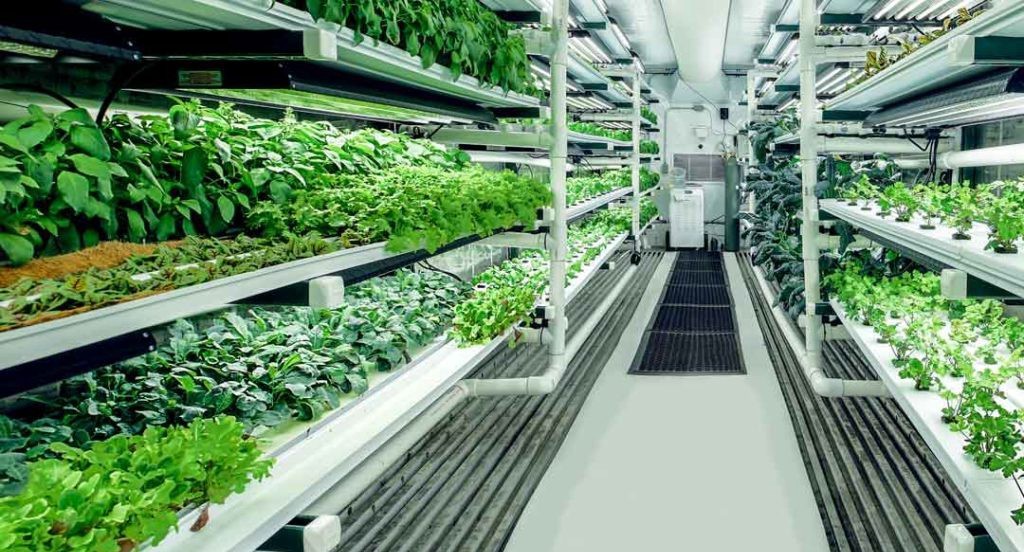
Akash K Sajith, Founder, Living Food Company started the business after a personal tragedy befell him when both his parents were diagnosed with cancer. Taking charge of things, he informs, “There are 1.5 million cancer deaths in our country and only one-fourth of them are caused due to tobacco while the remaining three-fourth are due to contaminated food.”
Sajith, who has worked for Myntra and Lookup in the past, had a fair understanding of how start-ups function. With his knowledge, he gave his heart and soul to his new venture Living Food Company. The company is the largest B2C player selling microgreens to households. He shares, “We didn’t want to sell microgreens to just five-star hotels and big chefs as my main aim was to deliver healthy, organic and quality food to Indian households.”
80 per cent of Living Food Company clients are B2C consumers. Sajith started Living Food Company by selling microgreens and then later expanded it by selling fresh oven to table sour bread, spreads, probiotic drinks, among other products. Sajith wants to bring the missing transparency in the food sector. “Currently, no vendor gives you the traceability on where your food is coming from, where it is grown, and under what conditions they are grown. With Living Food, I want to bring about a change in the system,” he declares.
From his wide experience of working with start-ups, Sajith has learnt to never give up even in the face of adversity. He shares, “In the first six months, Living Food had 500 consumers which in the next six months had risen to 4,500. We are consistently growing.” He is happy that Living Food Company is changing the food sector in India, even though in a small way. The company has its own farms where it grows fresh microgreens and vegetables.

They might have traded away their lucrative careers but none of them are regretful about it. A common thread that binds all these urban farming entrepreneurs is the high degree of job satisfaction. Anand who relocated from Mumbai to New York to Chandigarh, says, “I’ve realised you don’t need much in life. I am happy that my small business is able to generate employment and give something worthwhile back to society.”
Pillai has a retirement plan chalked out for himself. “I am working towards building my retirement abode. It will be a self-sustaining house with no electricity and power connection. I will generate my own electricity through solar panels and engage myself in rainwater harvesting,” he mentions.
Taking pride over the best decision of her life, Hamsa confesses that farming has made her more content and happy. But her journey as an urban farmer has been riddled with challenges. “Farming is a difficult profession that requires a lot of patience and perseverance. There are many things that are not in your control like natural calamities. We have had forest fires in our farm and our crops have been spoilt because of heavy rains but I do not ever regret getting involved in farming,” she happily shares.
| COMPANY | FOUNDERS | INCEPTION | SERVICES | EXPANSION PLAN |
|---|---|---|---|---|
| Homecrop | Manvitha Reddy, Sharmila Reddy, Sai Krishna and Krishna Reddy | 2017 | Set up edible customized gardens for households and provides maintenance services and online DIY kits. | Opening The Millet Bucket, the Indian superfood millet retail. |
| Growing Greens | Hamsa V and Nithin Sagi | 2012 | Provides live microgreens, edible flowers, salad leaves, sprouts and herbs to high-end restaurants, cafes and five-star hotels. | Expand farming from 4 acres to 10 acres of land. |
| Urban Green Fate (UGF) Farming | Linesh Pillai | 2017 | Conduct workshops on Urban Farming, retail live microgreens and live green veggies in high-end supermarkets and set up the hydroponic farming system at five-star hotels and high-end restaurants. | Will start operations in Dubai by June 2020. |
| Pindfresh | Somveer Singh Anand | 2016 | Set up indoor and outdoor hydroponic farming for clients and sells DIY kits online. | Expand the production and sale of the farming system. |
| Living Food Co | Akash K Sajith | 2018 | Does B2C business of selling microgreens, herbs, leafy greens, freshly baked sourdough bread, probiotic drinks etc. | Opening soon in Hyderabad. |
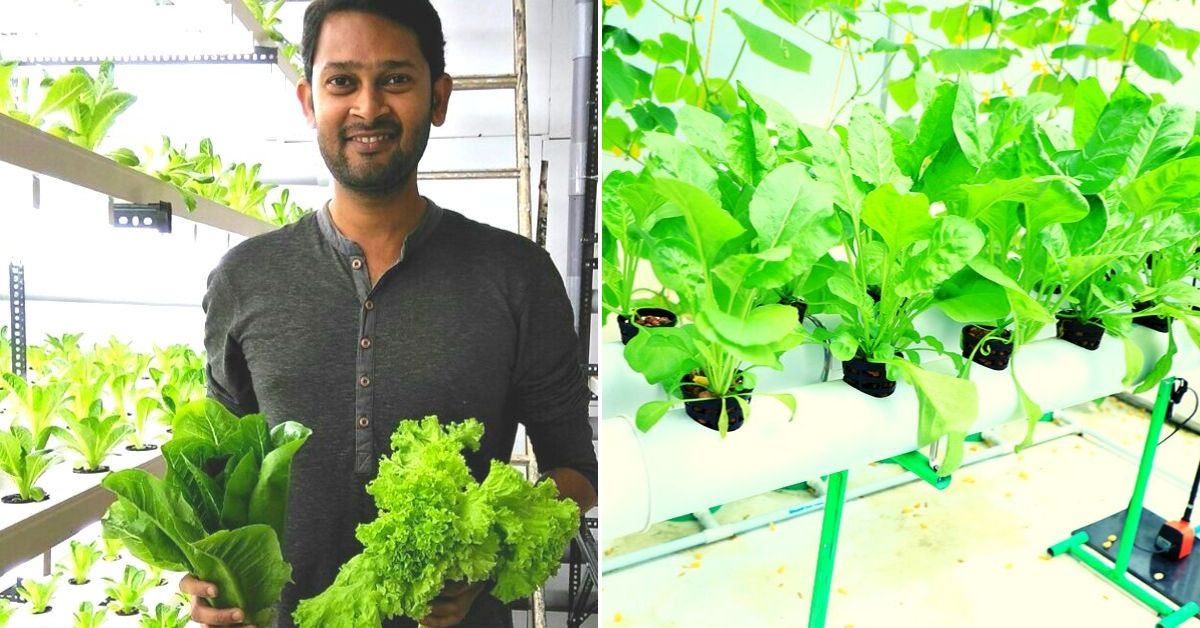 With new technologies like hydroponics and vertical farming, these startups are helping people grow produce in small urban spaces.
With new technologies like hydroponics and vertical farming, these startups are helping people grow produce in small urban spaces.
The Green Revolution in the 50s and 60s may have allowed our farmers to better their yields, but it also brought with it the evils of using pesticides and chemical fertilisers. Over the years, they have been incorporated into conventional farming methods, bringing with them a host of problems. They are not only found to be toxic to humans by increasing the risk of getting cancers, but they also cause pollution, degradation of soil and water, and poison domestic animals.
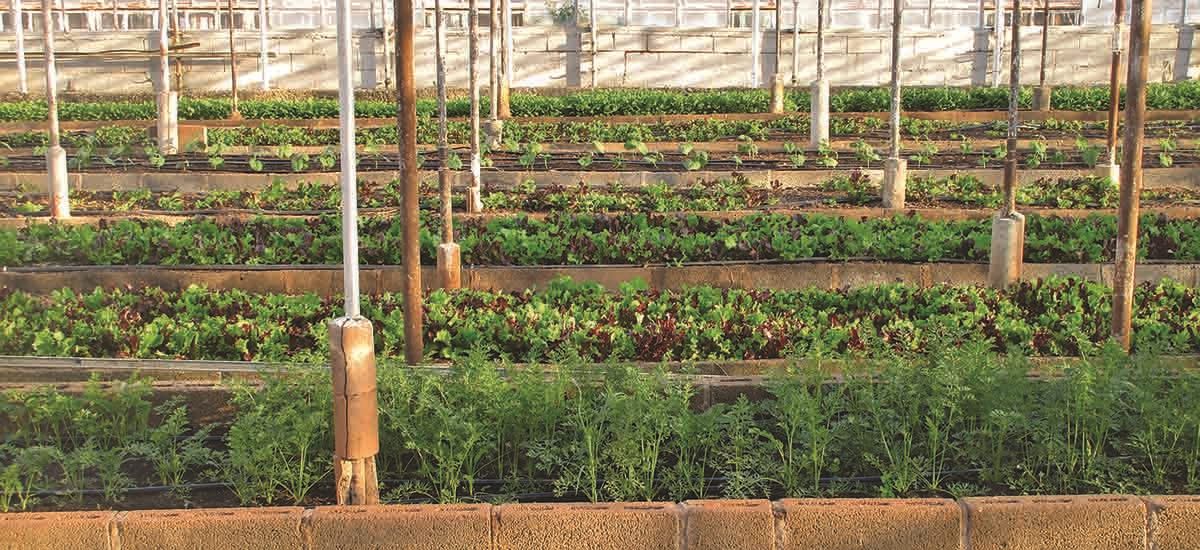 Now, many farmers and urban-dwellers have switched to organic farming or urban farming. According to the International Federation of Organic Agriculture Movements (IFOAM)
Now, many farmers and urban-dwellers have switched to organic farming or urban farming. According to the International Federation of Organic Agriculture Movements (IFOAM)
“Organic agriculture is a production system that sustains the health of soils, ecosystems, and people. It relies on ecological processes, biodiversity, and cycles adapted to local conditions, rather than the use of inputs with adverse effects.”
Just a few years back, farming in cities would have been thought to be impossible. But new technologies like hydroponics and vertical farming have made growing produce in small urban spaces possible.
Here are six urban farming startups which are going the extra mile to bring sustainable farming practices in India:
Started by Linesh Narayan Pillai in 2017, Urban Green Fate (UGF) Farms converts unused spaces into live food gardens. Live food gardens are built in a way that they do no structural damage to buildings. The Mumbai-based startup sends residents microgreens (vegetable greens after they’ve produced first leaves) in pots, to grow them in organic coco peat as opposed to heavy soil. All a user needs to do is cut the greens from the live plant as and when they need them.
Further, UGF also helps to address issues of starvation, malnutrition, food contamination, and food insecurity by collaborating with schools as well as corporates that work for underprivileged communities as part of their CSR initiatives.
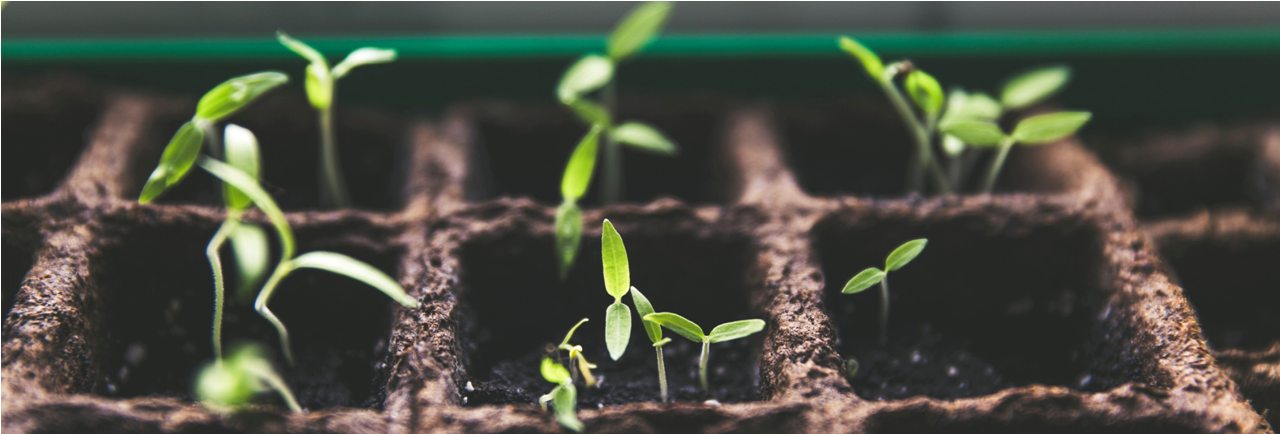
Since its inception, the startup has planted over 10,000 kg of microgreens. It has also educated 4,000 people over 150 workshops across multiple locations in Delhi and Mumbai about the importance of growing food in their home and going organic.
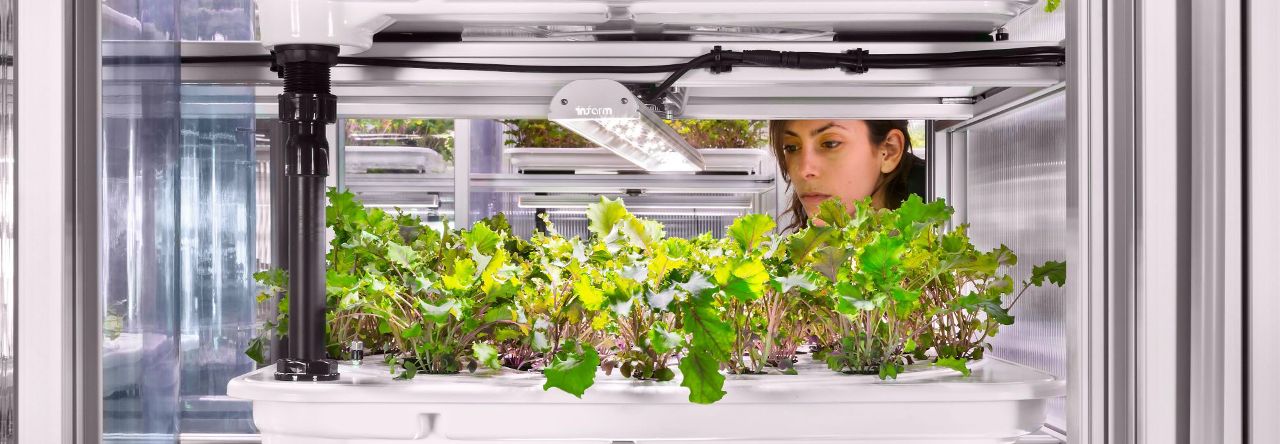
The startup deals in more than 90 varieties of seasonal produce in four categories – fruits, vegetables, greens, and exotics. It has reserved almost three to four acres for customers who wish to visit the farm and try their hand out in agriculture.
It produces products that are 100 percent organic. The producer has full control over the colour and texture of the greens, making them healthier and tastier.
After returning from New York where he worked as a banker, Somveer Singh Anand, much like UGF Farms' Linesh, found it impossible to source organic food in India.
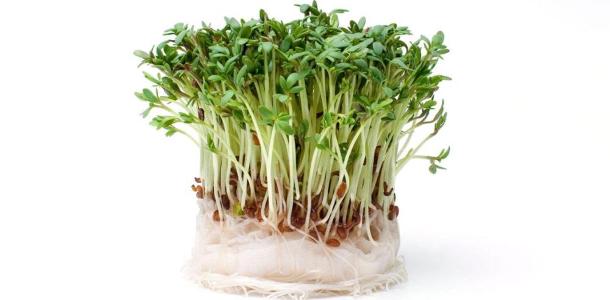
To address this concern, Somveer developed indoor hydroponic technology suitable for Indian climatic conditions and started Pindfresh in 2016 in Chandigarh. The startup sets up indoor and outdoor hydroponic plants for people who want to farm using the technology across India. The lighting, humidity, and temperature are controlled all the time for these microgreens to grow. And to that effect, Pindfresh manufactures quality controlled pipes, lights, and all the necessary equipment required to set up a hydroponic plant.
Former Infosys employees Hamsa V and Nithin Sagi partnered to start a hydroponic farm, Growing Greens. The Bengaluru-based B2B startup grows and sells microgreens, salad leaves, sprouts, edible flowers, and herbs to high-end restaurants in the city.
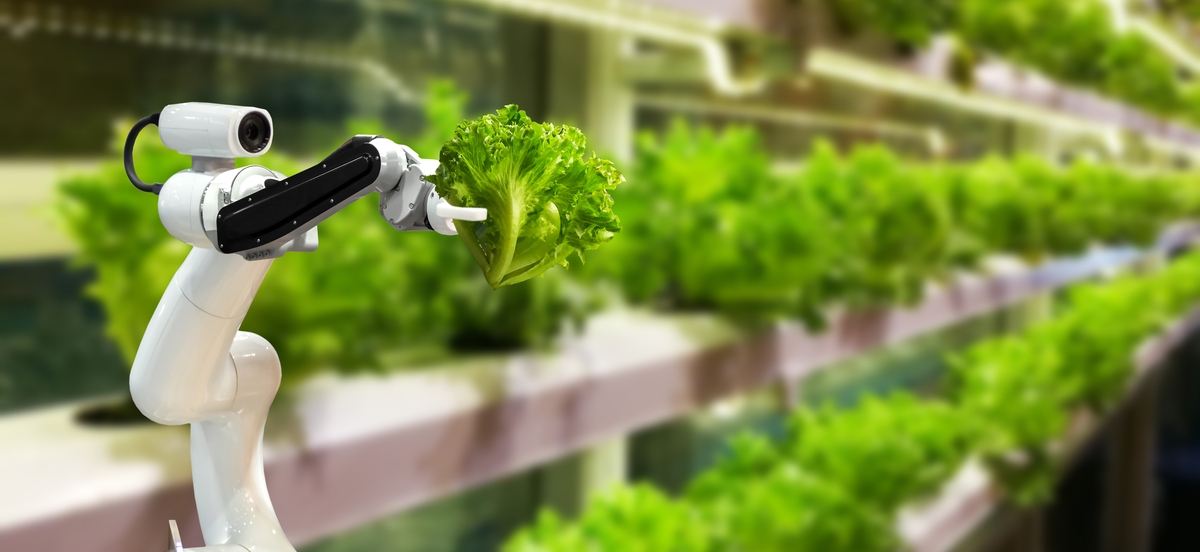
These microgreens, which are about one to three inches tall, are mostly used to decorate and garnish food. They have concentrated nutrient levels that can be almost 40 times higher than the normal-sized produce. The duo did thorough research by talking to various chefs to understand their requirements before venturing into the business. Started in 2012 on a small terrace, the startup is currently farming on four acres of land, which it plans to expand to 10 acres.
Not many 24-year-olds would choose to ditch well-paying jobs and take up farming. But after paying a visit to Auroville in Puducherry in 2017, Mumbai-based Joshua Lewis and Sakina Rajkotwala were inspired by musician and organic farmer Krishna Mckenzie who started Solitude Farm with the aim of “honouring Mother Nature through local food.”

The duo got down to business with Herbivore Farms, Mumbai’s first hyperlocal, hydroponic farm. Today, the farm is spread across 1,000 sq ft and grows 2,500 plants. It sells fresh, organic vegetables to customers across Mumbai from its temperature-controlled indoor setting. The vegetables are grown in a clean, sterile environment, with zero pesticides. As compared to conventional farming methods, the setup consumes up to 80 percent less water to grow the produce due to “recirculating irrigation system.” Harvested vegetables are delivered to the customers’ homes within hours, maintaining their freshness, nutrition, and flavour.
| Serial No. | Time Period | Rupees | Quantity |
|---|---|---|---|
| 1. | For a Day | 100 | 1-2 KGs |
| 2. | For a Week | 500 | 10 KGs |
| 3. | For a Month | 1000 | As You Needs |
| 4. | For a Year | 10000 | As You Needs |
| 5. | Life Time Membership | 51000 | |
| 6. | Founder Membership | 111000 |